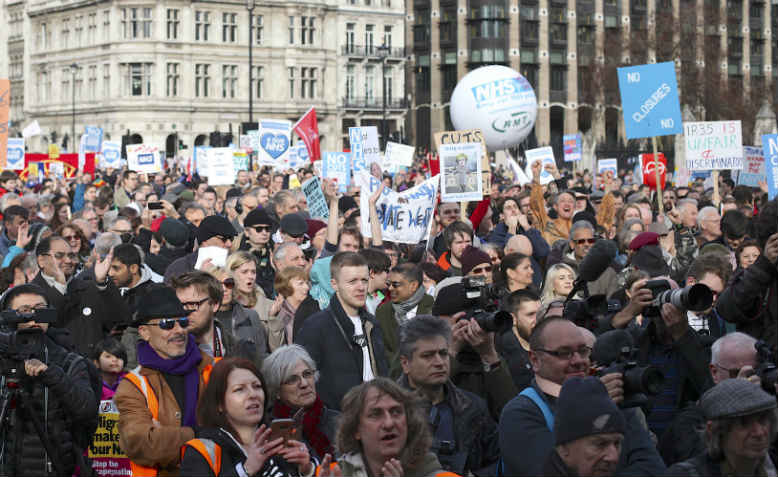 March for Our NHS, March 2017. Photo: Jim Aindow
March for Our NHS, March 2017. Photo: Jim Aindow
The Carillion and NHS crises lay bare the failures of neoliberalism; we must fight to end this market madness
The NHS is in crisis. This is not an accident, but a direct result of Tory policies. It is a consequence of sustained underfunding. For all the lip service and fine words from the government, there is no sign that it will put in the money required to fund services properly.
Hospital beds are being lost under the guise of introducing Sustainability and Transformation Plans (14,000 hospital beds have gone since 2010). This is often linked to rhetoric about shifting the focus to ‘care in the community’, but without funding or co-ordinating social care. There are major problems with recruiting and retaining staff in social care – often low-paid and precarious workers – just as much as in hospitals.
Incredibly, Health Secretary Jeremy Hunt was given responsibility for social care in Theresa May’s recent cabinet reshuffle. He should have been sacked, not awarded more responsibilities. His time as health secretary has been a disaster. Increasing involvement by the private sector has been accompanied by real-terms cuts.
GP surgeries and walk-in centres are being closed. Accident and emergency units are being downgraded or even closed. Ambulance services are under severe strain. The number of district nurses has been cut dramatically since 2010 and places on nursing courses are now being slashed. What is sustainable about any of this?
It isn’t just the NHS where the twin failures of privatisation and cuts are being exposed. The Carillion fiasco was yet another devastating blow to an already crisis-ridden government. It threatens tens of thousands of jobs and a startling range of important services and infrastructure projects.
As with the NHS crisis, the Carillion collapse points to the damage done by the neoliberal regime. Privatisation and deregulation have delivered eye-watering pay packets and healthy profits for bosses, but they have not catered for people’s needs. When things go wrong, from the financial crash of 2008 to the collapse of Carillion, the priority is to bail out those who created the mess.
The establishment is facing a series of crises that are real and immediate, but also intensely ideological. They throw up big questions about how we have been governed for decades and the kind of society we need to address people’s needs. No wonder there has been a backlash against the so-called ‘centre ground’. Growing support for Jeremy Corbyn’s Labour has been driven by revulsion at austerity, growing inequality and the failures of neoliberal politics.
The labour movement must rise to the challenge. We need the biggest possible popular mobilisations starting with the emergency NHS demonstration on 3rd February. We need to support every strike and protest going. We need to build a movement big enough to threaten this discredited government.
On 3 February we are hitting the streets to fight for the NHS: a major London demonstration plus local actions elsewhere. Organisers are demanding: an end to the winter crisis with a cash injection to restore the NHS budget to health; commitment to increased funding each year; an end to the cap on NHS pay; no more closures or privatisation.
The protests should lead to further mass action against the running down of the NHS, bringing the numerous local campaigns – against cuts in hospitals, GP surgeries, walk-in centres, mental health services and social care – together in a concerted, nationwide movement. The People’s Assembly Against Austerity, Labour activists, health campaigns and trade unions can work together to force real change in the NHS – more funding and an end to the market madness.
The same approach is needed to defend schools from cuts, to deal with the housing crisis, and to stop the attacks on working class living standards from Universal Credit to the public sector pay squeeze. Local Labour Party branches and trade union bodies can pass resolutions supporting protests and campaigns, such as the NHS protests and the TUC national demonstration against the pay cap lined up for 12 May. These resolutions ought to be the basis for practical action: sending delegations; promoting demonstrations; raising money.
We also need to drive home the political points. Outsourcing is a rip off and the free market is dysfunctional. Democratically controlled and properly funded public services are a matter of urgency. We need to invest in – not cut – infrastructure, services and jobs. The left can offer a political alternative to the Tories’ tired and failed mantras.

